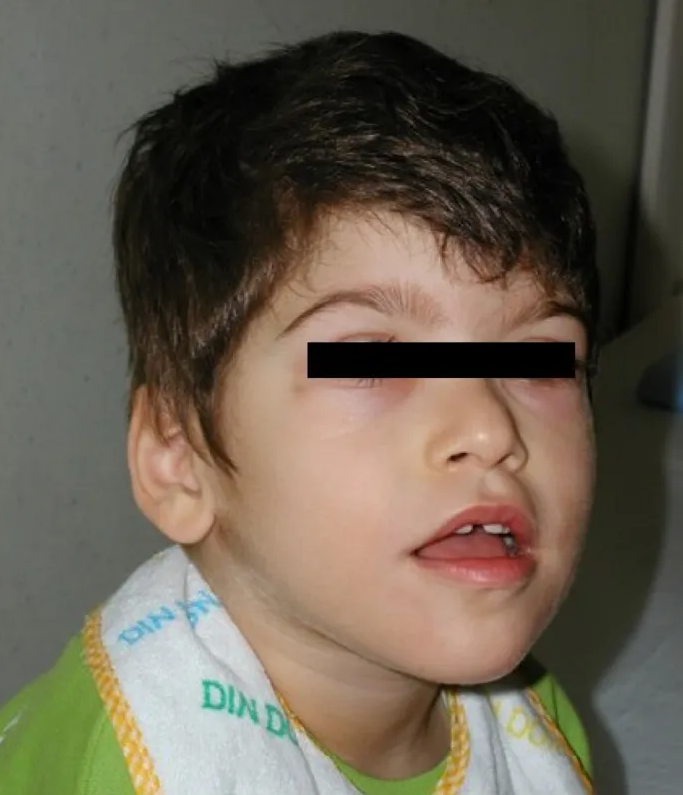Pitt–Hopkins syndrome

Editor-In-Chief: Prab R Tumpati, MD
Obesity, Sleep & Internal medicine
Founder, WikiMD Wellnesspedia &
W8MD medical weight loss NYC and sleep center NYC
| Pitt–Hopkins syndrome | |
|---|---|

| |
| Synonyms | PTHS |
| Pronounce | |
| Specialty | Medical genetics |
| Symptoms | Developmental delay, intellectual disability, breathing abnormalities, seizures, distinctive facial features |
| Complications | N/A |
| Onset | Infancy |
| Duration | Lifelong |
| Types | N/A |
| Causes | Genetic mutation in the TCF4 gene |
| Risks | |
| Diagnosis | Genetic testing |
| Differential diagnosis | Angelman syndrome, Rett syndrome, Mowat–Wilson syndrome |
| Prevention | N/A |
| Treatment | Symptomatic treatment, supportive care |
| Medication | Anticonvulsants for seizures |
| Prognosis | Variable, generally stable |
| Frequency | Rare, estimated 1 in 34,000 to 1 in 41,000 |
| Deaths | |
Pitt–Hopkins syndrome (PTHS) is a rare genetic disorder characterized by developmental delay, intellectual disability, distinctive facial features, and breathing abnormalities. It is caused by mutations in the TCF4 gene, which plays a crucial role in the development and function of the nervous system.
Signs and Symptoms[edit]
Individuals with Pitt–Hopkins syndrome typically exhibit a range of symptoms, including:
- Severe intellectual disability
- Developmental delay
- Distinctive facial features such as a wide mouth, prominent lips, and deep-set eyes
- Breathing abnormalities, including episodes of hyperventilation and apnea
- Seizures
- Gastrointestinal issues, such as constipation
- Motor skills impairment
- Behavioral issues, including anxiety and stereotypic movements
Genetics[edit]
Pitt–Hopkins syndrome is caused by mutations in the TCF4 gene located on chromosome 18. The TCF4 gene is responsible for encoding a transcription factor that is essential for the development of the nervous system. Mutations in this gene disrupt normal brain development and function, leading to the symptoms observed in PTHS.
Diagnosis[edit]
Diagnosis of Pitt–Hopkins syndrome is based on clinical evaluation and genetic testing. The presence of characteristic facial features, developmental delay, and breathing abnormalities may prompt genetic testing to identify mutations in the TCF4 gene.
Management[edit]
There is currently no cure for Pitt–Hopkins syndrome. Management focuses on addressing the symptoms and improving the quality of life for affected individuals. This may include:
- Physical therapy and occupational therapy to improve motor skills
- Speech therapy to address communication difficulties
- Medications to manage seizures and behavioral issues
- Regular monitoring and treatment of gastrointestinal issues
Epidemiology[edit]
Pitt–Hopkins syndrome is a rare condition, with an estimated prevalence of less than 1 in 34,000 individuals. It affects both males and females equally.
History[edit]
Pitt–Hopkins syndrome was first described in 1978 by Dr. David Pitt and Dr. Ian Hopkins, who identified two patients with similar clinical features. Since then, advances in genetic testing have allowed for the identification of the underlying genetic cause of the syndrome.
See Also[edit]
- Intellectual disability
- Developmental delay
- Genetic disorders
- Seizures
- Physical therapy
- Occupational therapy
- Speech therapy
References[edit]
<references group="" responsive="1"></references>
External Links[edit]
Ad. Transform your life with W8MD's Budget GLP-1 injections from $75


W8MD offers a medical weight loss program to lose weight in Philadelphia. Our physician-supervised medical weight loss provides:
- Weight loss injections in NYC (generic and brand names):
- Zepbound / Mounjaro, Wegovy / Ozempic, Saxenda
- Most insurances accepted or discounted self-pay rates. We will obtain insurance prior authorizations if needed.
- Generic GLP1 weight loss injections from $75 for the starting dose.
- Also offer prescription weight loss medications including Phentermine, Qsymia, Diethylpropion, Contrave etc.
NYC weight loss doctor appointmentsNYC weight loss doctor appointments
Start your NYC weight loss journey today at our NYC medical weight loss and Philadelphia medical weight loss clinics.
- Call 718-946-5500 to lose weight in NYC or for medical weight loss in Philadelphia 215-676-2334.
- Tags:NYC medical weight loss, Philadelphia lose weight Zepbound NYC, Budget GLP1 weight loss injections, Wegovy Philadelphia, Wegovy NYC, Philadelphia medical weight loss, Brookly weight loss and Wegovy NYC
|
WikiMD's Wellness Encyclopedia |
| Let Food Be Thy Medicine Medicine Thy Food - Hippocrates |
Medical Disclaimer: WikiMD is not a substitute for professional medical advice. The information on WikiMD is provided as an information resource only, may be incorrect, outdated or misleading, and is not to be used or relied on for any diagnostic or treatment purposes. Please consult your health care provider before making any healthcare decisions or for guidance about a specific medical condition. WikiMD expressly disclaims responsibility, and shall have no liability, for any damages, loss, injury, or liability whatsoever suffered as a result of your reliance on the information contained in this site. By visiting this site you agree to the foregoing terms and conditions, which may from time to time be changed or supplemented by WikiMD. If you do not agree to the foregoing terms and conditions, you should not enter or use this site. See full disclaimer.
Credits:Most images are courtesy of Wikimedia commons, and templates, categories Wikipedia, licensed under CC BY SA or similar.
Translate this page: - East Asian
中文,
日本,
한국어,
South Asian
हिन्दी,
தமிழ்,
తెలుగు,
Urdu,
ಕನ್ನಡ,
Southeast Asian
Indonesian,
Vietnamese,
Thai,
မြန်မာဘာသာ,
বাংলা
European
español,
Deutsch,
français,
Greek,
português do Brasil,
polski,
română,
русский,
Nederlands,
norsk,
svenska,
suomi,
Italian
Middle Eastern & African
عربى,
Turkish,
Persian,
Hebrew,
Afrikaans,
isiZulu,
Kiswahili,
Other
Bulgarian,
Hungarian,
Czech,
Swedish,
മലയാളം,
मराठी,
ਪੰਜਾਬੀ,
ગુજરાતી,
Portuguese,
Ukrainian
